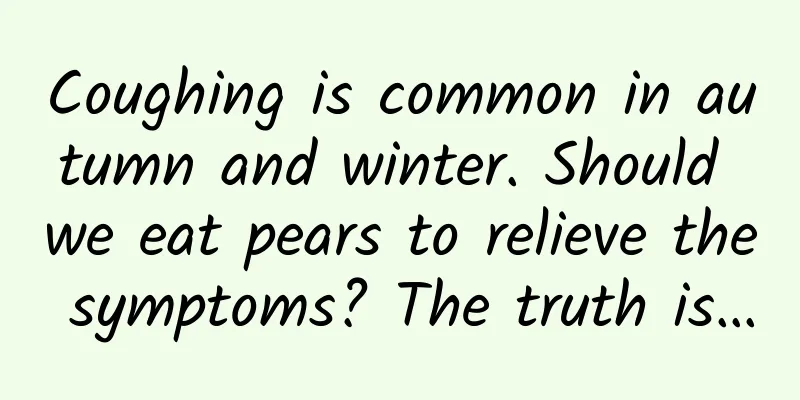Coughing is common in autumn and winter. Should we eat pears to relieve the symptoms? The truth is…

|
gossip In autumn and winter, the temperature gradually drops, and the wind dries things out. With the changes in meteorological indicators such as sunshine and temperature, the physiological state of the human body is also changing. If you are not careful, you are prone to getting sick. In addition, this time of year is also the peak season for respiratory diseases. In order to adapt to seasonal changes, the ancients constantly explored a series of health-preserving secrets in their survival. The main theme in autumn and winter is "nourishment". For example, "one pear moisturizes three autumns", which is to use the nourishing effect of pears to moisten dryness, nourish yin, and moisten the lungs. Recently, there is a saying circulating on the Internet that eating more pears in autumn and winter can cure coughs . Is this true? In fact, not all coughs can be resolved by pears. analyze What is unique about the nutritional value of pears ? Pear, the fruit of the tree plant of the genus Pyrus in the Rosaceae family, has a long history of cultivation in my country. There is a saying that the original species of pear originated in the mountainous areas of western or southwestern China in the Tertiary Period or even earlier. It is one of the earliest fruits to be cultivated artificially, so it was revered by the ancients as the ancestor of all fruits. There are many varieties of pears, and there are at least 30-40 species of pear plants. The ones we are familiar with include white pear, sand pear, autumn pear, Xinjiang pear, etc. Copyrighted stock images, no reproduction is authorized Although there are many varieties of fruits available now, many people still like pears. On the one hand, it is because of its fresh taste, sweet taste, and its rich nutritional value. From the nutritional data, the calories of pears per 100g are 44 kcal, which is only 1/7 of wheat. It contains almost no fat and is a low-energy, low-fat and low-cholesterol food . Moreover, the sugar contained in pears is mainly monosaccharides such as glucose and fructose, and the glycemic index (GI) value is only 33, which is a low-glycemic fruit . People with stable blood sugar control can also eat it in moderation. In addition, pears are rich in a variety of organic acids, which also give them a unique and appropriate acidity. The rich variety of phenolic plant compounds, such as chlorogenic acid, gentisic acid, syringic acid, vanillic acid, etc., also give them a certain antioxidant effect . If the cut pears or the squeezed pear juice are left for a period of time, the snow-white flesh will turn brown, precisely because of the rich antioxidants in it. At the same time, pears are also a treasure trove of dietary fiber , with a content of between 3% and 9%, which has the effect of promoting intestinal peristalsis. Pear is one of the fruits with high water content , with the water content reaching as high as 83%-88%. Eating one when you are thirsty can instantly quench your thirst, so it is also known as "natural mineral water". Is it really good to eat pears in autumn and winter ? The answer is yes, but it also depends on the person and the amount. From ancient times to the present, Chinese people love to eat pears very much, which can be seen from the allusions and poems such as "Kong Rong gave away his pears", "Suddenly, as if one night the spring breeze came, thousands of pear trees blossomed", and "Old pears are as sweet as candy, while snow pears are crisp and juicy". In addition to its high nutritional value, eating pears also has certain health benefits. Traditional Chinese medicine believes that pears are slightly cold and sweet in nature, and have the effects of promoting body fluid, moistening dryness, clearing heat, relieving cough, and reducing phlegm. Regular consumption of pears is beneficial for nourishing yin, lowering blood pressure, protecting the liver, aiding digestion, and losing weight. It can also relieve symptoms such as colds and coughs, fever, irritability, and constipation, and can also detoxify alcohol. For example, it is recorded in the Compendium of Materia Medica that "pears are beneficial, and their nature is downward and fluent." The general idea is that pears can not only clear heart fire, clear lung heat and treat coughs, but also have the effect of moistening the intestines and relieving constipation. Copyrighted stock images, no reproduction is authorized Eating more pears in autumn and winter can not only replenish the water needed by the body, but also provide the body with more vitamin C and antioxidants, which have a good nourishing and protective effect on the respiratory tract and skin . At the same time, the rich dietary fiber content can help improve intestinal peristalsis and digestion, promote defecation, and improve and prevent constipation . Eating more pears in autumn and winter can cure cough. Is there any scientific basis for this ? There is some basis for this, but not all cough problems can be solved. Coughing is a defense mechanism of the human body that helps to clear respiratory secretions and foreign matter in the airways, prevent respiratory infections, and keep the airways open. There are many factors that cause coughing. When the nasal cavity, throat, trachea, bronchi, pleura and other parts are stimulated by external factors, the stimulation will be reported to the medulla oblongata. The cough center inside it will command the contraction of the pharyngeal muscles, diaphragm and other muscles, and a coughing reaction will occur. Some coughs are caused by normal defensive reflexes , such as inhalation of dust or pollen, or food accidentally entering the respiratory tract, or even irritation of the ear canal can trigger coughing symptoms. Some coughs are pathological coughs caused by abnormal activation of the cough reflex due to various reasons . For example, fever caused by infection with pathogenic factors is often accompanied by cough. Respiratory system tumors can also cause cough symptoms in addition to pain. Chronic bronchitis and chronic obstructive pulmonary emphysema, which are the most common in autumn and winter, can also cause cough symptoms. In summary, the factors that cause cough include physical factors, chemical factors, infectious factors, allergic factors, and other factors. There are indeed records in ancient Chinese medical books about eating pears to relieve coughs. For example, in Treatise on Warm Diseases, there is a record of mixing pear juice, water chestnut juice, reed root juice, ophiopogon juice and lotus root juice into a "five juice drink" that has the effect of promoting body fluid and quenching thirst and relieving coughs. The description of "Sangxing Decoction" also mentions that pears can be used as medicine to moisten the lungs and relieve coughs. In addition, some studies have shown that the glycosides and tannic acid contained in pears can relieve phlegm and cough, and have a nourishing effect on the throat. Eating pears can also replenish water and relieve symptoms such as sore throat and cough caused by dryness. Copyrighted stock images, no reproduction is authorized However, modern medicine believes that eating pears or drinking pear soup can only relieve a very small part of the cough. For common cold coughs and coughs caused by infections, it is not only ineffective but may even be counterproductive . What should we pay attention to when eating pears in autumn and winter ? There are many varieties of pears, and they vary in smell, sweetness, and tenderness, but the nutritional value is not that different. You should choose according to your own preferences. The more expensive the better. After all, the temperature is lower in autumn and winter, so it is not advisable to eat too many pears at one time. One pear a day is enough. Moreover, Chinese medicine believes that pears are inherently cold and suitable for moistening, warming and drying but not suitable for moistening, cooling and drying. For those with weak spleen and stomach, eating too much may aggravate their condition and may also cause diarrhea and indigestion problems. Therefore, you need to eat it with discretion and don't be greedy. In addition, pears have a certain diuretic effect, so it is recommended not to eat them before going to bed. Copyrighted stock images, no reproduction is authorized in conclusion There are many reasons for coughing. Eating pears or drinking pear soup can only relieve symptoms such as sore throat and cough caused by dryness. It has no effect on common cold coughs and coughs caused by infections. It is recommended that patients with coughs seek medical attention in time . Author: Zhang Yu, researcher at the Chinese Center for Disease Control and Prevention, supervisor of medical doctorate and master's degree students Reviewer: Zhang Na, Associate Researcher, Doctoral Supervisor, Peking University School of Public Health Planning丨Zhong Yanping Editor|Li Mengxin This article is produced by "Science Facts" (ID: Science_Facts). Please indicate the source when reprinting. The cover image and the images in the text are from the copyright gallery. Reprinting and citing may cause copyright disputes. |
<<: Simple and practical! The linear iteration method created by three Germans surpassed an era
>>: The blueprint of life: genes? More than just genes!
Recommend
What changes will happen to your body after falling in love? Some of them you may not even realize...
Expert of this article: Zhao Wei, MD, associate c...
This time, 41 "passengers" went into space! China's space program set a new record of launching 41 satellites in one rocket
At 13:30 on June 15, China successfully launched ...
Will drinking tea frequently cause kidney stones? The truth is...
“Drinking tea frequently can lead to kidney stone...
With 120 minutes left before sudden death from myocardial infarction, what else can we do?
I hope everyone can master a little more first ai...
Why don't goats need to go to the dentist?
Goats are creatures with sharp teeth, thin lips, ...
Tesla's new promotional method: It turns out that cars can be sold like this
Beijing time, July 30 morning news, Tesla announc...
Mercedes-Benz factory workers to strike again after talks fail
According to Reuters recently, on November 24, wo...
How to make data statistical tables for SEM? SEM data reports and problem analysis ideas!
Account data statistical analysis is the most imp...
How to improve ROI? Internet marketing combination methodology!
This article will focus on the general Internet m...
User growth has undergone a qualitative change, from AARRR to RARRA!
Today, the topic I want to share with you is the ...
Change from injection to oral administration! How amazing is the technology of the "magic weight loss drug" semaglutide tablets?
In January 2024, semaglutide tablets were approve...
Don’t throw away waste cement, it can be used again after being heated in a furnace!
□ Right to speak Using electric-powered furnaces ...
WeChat Mini Games is open to third-party testing for the first time. You also have the opportunity to create another "Jump Jump"
Since the mini-game was officially launched on De...
Get rid of singleness on Valentine’s Day with these copywritings
More recommendations: Female: You once said that ...









